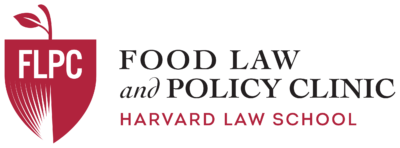
Harvard Food Law & Policy Clinic
The Harvard Food Law & Policy Clinic (HFLPC) has written issue briefs about the impacts of COVID-19 on the food system, developed food policy recommendations, and drafted federal legislation since the onset of the pandemic. When policies, such as the ones HFLPC recommends to expand enhanced tax deductions for food donors or to enable wider use of SNAP benefits, are enacted, tens of millions more pounds of food waste will be rescued.
STORIES AND PHOTOS
According to FLPC, "In June, we launched two state policy tracking tools. The first, our State Policies for Feeding Marginalized Populations Tool, tracks state policies that facilitate food delivery, food at centralized pick-up locations, and funding to support emergency feeding programs. Our research emphasizes marginalized populations – including older adults, differently abled individuals, low-income households, children, and those experiencing homelessness.
"The second policy tracker looks at state-wide stay-at-home orders and advisories. This document emphasizes the impact of those orders and advisories and how they are treating the food system. These tools will serve as a vital resource for tracking best practices, identifying shortfalls, and helping direct practitioners to programs and funding.
"FLPC has synthesized information gathered through the policy trackers into a public Google sheet and will update the sheet regularly throughout the grant period, as well as publish several blog posts that analyze specific best practices or policy suggestions from the policies tracked. The trackers are available here.
"In addition to tracking state policies, FLPC is tracking and analyzing other federal bills such as the Heroes Act and the Food Supply Protection Act that have provisions for small farmers.
"In the coming weeks, several U.S. Senators will be introducing legislation that FLPC drafted in coordination with a larger coalition. The legislation includes several avenues to make it easier for food retailers to participate in online SNAP sales. As USDA has rolled out online SNAP sales in response to the pandemic, in most states, very few retailers or vendors are able to qualify for online SNAP sales, which is leading to excess food at some vendors and consolidation of the market in the hands of a few vendors. This legislation will make it easier for smaller vendors or independent retailers to accept online SNAP by providing funding to USDA to develop an online EBT payment portal serving smaller vendors and by providing funding for technical assistance to other retailers. We also anticipate that one of the Representatives we are working with will be introducing legislation to create several tax incentives for food donation, including expanding the existing enhanced deduction to include food offered for sale at a low price, creating a new deduction to cover the cost of transporting donated food, and creating an alternative tax credit that farmers can claim instead of the enhanced deduction."